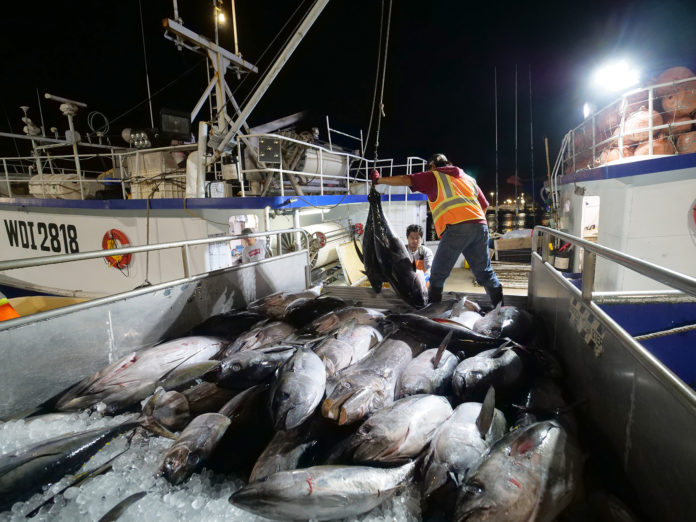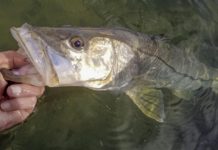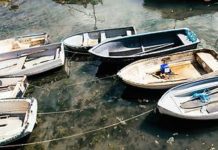WASHINGTON — The Hawaii Longline Association says it welcomes the recommendations contained in two recent reports to Congress that outline ways the seafood industry can prevent labor abuse.
The longliners, which primarily target tuna and swordfish, faced intense scrutiny after a 2016 investigation by The Associated Press found a number of foreign crewmen working the vessels were living in squalid conditions and earning as little as 70 cents an hour.
Since then, Congress has called for more oversight of the national and international seafood industry, particularly when it comes to issues of illegal fishing and human trafficking.
Hawaii’s longline vessels, seen here near Pier 38 at Honolulu Harbor, catch fresh bigeye tuna for the islands.
Cory Lum/Civil Beat
Eric Kingma, HLA executive director, says the local longline fleet has already taken several steps to ensure Hawaii’s fishermen are treated humanely. While he took issue with some of the findings of the AP articles, he acknowledged it sparked a needed conversation about how foreign fishermen are treated.
“That report did damage to the reputation of our fishery and we’re still dealing with that, but we have to move on,” Kingma said. “Certainly, we took the issue very seriously and responded with our own review of crew, captains and vessel owners.”
He said HLA’s internal review did not find any evidence of human trafficking or forced labor in the longline fleet, which is made up of about 140 vessels and nearly 700 foreign fishermen.
In 2018, two Indonesian fishermen who worked on a Hawaii vessel settled a human trafficking lawsuit in which they claimed they were verbally abused and denied medical treatment.
Kingma said the association has developed a written code of conduct and crew handbook that lays out a process for filing grievances over workplace conditions and contractual disputes. Phone numbers to local community resources, including the Seafarers Ministry and medical professionals, are also provided.
All the information, Kingma said, is translated into the native languages of the fishermen, many of whom come from Indonesia, the Philippines, Vietnam and other Pacific island countries.
Kingma pointed to the recent reports to Congress, including one released last month by a special task force of the U.S. Justice Department, that specifically addresses the need for the U.S. to combat illegal fishing and human trafficking in the seafood industry.
He said the HLA agrees with many of the recommendations in those reports and encourages Congress to take action, particularly on legislation that provides work visas to foreign fishermen in Hawaii.
For years, foreign crew members working on U.S.-flagged vessels have caught the fish found in Hawaii’s poke shops, supermarkets and restaurants, but have not been allowed to step foot outside of Honolulu Harbor due to their immigration status.

Eric Kingma, of the Hawaii Longline Association, says the local Hawaii fleet has taken it upon itself to improve work conditions for fishermen.
Nathan Eagle/Civil Beat
This means that when they’re not out at sea they must live on the boats and stay within the fenced boundaries of the harbor.
The only time they can leave is to fly home at the end of a two-year contract.
Kingma said getting the foreign fishermen to Hawaii is a challenge in and of itself. Before the coronavirus pandemic, many vessels would travel to American Samoa where they would pick up their foreign crew and get to work.
When the country closed its borders to prevent the spread of COVID-19, Kingma said the fishermen would fly to Mexico where they would then get picked up by a Hawaii vessel that spent nearly two weeks chugging across the Pacific.
“It’s inefficient and it’s costly to have the vessels stop fishing and go pick up their crew,” Kingma said. “These crewmen are integral to the fishery just as our migrant workers are integral to the nation’s agricultural system. We need to remedy this situation to allow these guys to have a visa that allows them to fly into Hawaii.”
In response to the AP article, Hawaii’s federal delegation, led by U.S. Sen. Mazie Hirono, introduced legislation in 2017 that would allow foreign fishermen to come ashore, but it died without so much as a hearing.
Kingma said he hopes the delegation resurrects its efforts now that Democrats are in control of both the White House and Congress.
“We’ve been supportive of that for a long time and now is the time to make it happen,” Kingma said. “It doesn’t make any sense for a migrant farm worker to have a visa and a foreign crewman not to have a visa. Both are integral to the production of food in Hawaii. It’s time to fix that.”
Members of Hawaii’s federal delegation were unavailable to comment Friday.
Read the task force’s report below.

Sign up for our FREE morning newsletter and face each day more informed.
Credit: Source link































